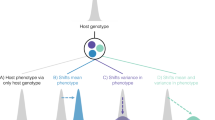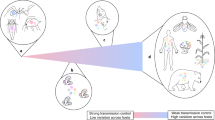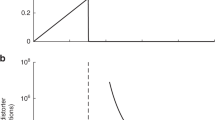Abstract
Replying to: M. J. Wade et al. Nature 463, 10.1038/nature08809 (2010)
We previously showed how inclusive-fitness theory separates various components of selection on parasite virulence1. Wade et al.2 do not seem to dispute our results or make new predictions. Instead, they state that insufficient attention was given to multilevel-selection theory2. However, we pointed out the links to multi-level selection1, and we believe that a misunderstanding has arisen because they have fundamentally conflated selection and adaptation.
This is a preview of subscription content, access via your institution
Access options
Subscribe to this journal
Receive 51 print issues and online access
$199.00 per year
only $3.90 per issue
Buy this article
- Purchase on Springer Link
- Instant access to full article PDF
Prices may be subject to local taxes which are calculated during checkout
Similar content being viewed by others
References
Wild, G., Gardner, A. & West, S. A. Adaptation and the evolution of parasite virulence in a connected world. Nature 459, 983–986 (2009)
Wade, M. J. et al. Multilevel and kin selection in a connected world. Nature 463 10.1038/nature08809 (2010)
West, S. A., Griffin, A. S. & Gardner, A. Social semantics: how useful has group selection been? J. Evol. Biol. 21, 374–385 (2008)
Wilson, D. S. & Wilson, E. O. Rethinking the theoretical foundation of sociobiology. Q. Rev. Biol. 82, 327–348 (2007)
Goodnight, C. et al. Evolution in spatial predator-prey models and the “prudent predator”: the inadequacy of steady-state organism fitness and the concept of individual and group selection. Complexity 13, 23–44 (2008)
Wilson, D. S. Social semantics: toward a genuine pluralism in the study of social behaviour. J. Evol. Biol. 21, 368–373 (2008)
Werfel, J. & Bar-Yam, Y. The evolution of reproductive restraint through social communication. Proc. Natl Acad. Sci. USA 101, 11019–11024 (2004)
Kohn, M. Darwin 200: the needs of the many. Nature 456, 296–299 (2008)
Wilson, D. S. & O’Brien, D. T. in Games, Groups, and the Global Good (ed. Levin, S. A.) 115–168 (Springer-Verlag, 2009)
Gardner, A. Adaptation as organism design. Biol. Lett. 5, 861–864 (2009)
Hamilton, W. D. in Biosocial Anthropology (ed. Fox, R.) 133–155 (Wiley, 1975)
Hamilton, W. D. The genetical theory of social behaviour I and II. J. Theor. Biol. 7, 1–16 (1964)
Grafen, A. Optimization and inclusive fitness. J. Theor. Biol. 238, 541–563 (2006)
Gardner, A. & Grafen, A. Capturing the superorganism: a formal theory of group adaptation. J. Evol. Biol. 22, 659–671 (2009)
Krebs, J. R. & Davies, N. B. Introduction to Behavioural Ecology 3rd edn (Blackwell, 1993)
Author information
Authors and Affiliations
Ethics declarations
Competing interests
The authors declare no competing financial interests
Rights and permissions
About this article
Cite this article
Wild, G., Gardner, A. & West, S. Wild, Gardner & West reply . Nature 463, E9–E10 (2010). https://doi.org/10.1038/nature08810
Issue Date:
DOI: https://doi.org/10.1038/nature08810
Comments
By submitting a comment you agree to abide by our Terms and Community Guidelines. If you find something abusive or that does not comply with our terms or guidelines please flag it as inappropriate.



